Welcome to my "marketing for artists" series on Steemit. In the time going forward, I will be posting a series of marketing-related posts to help out indie musicians the best way I can. I know a lot of people are struggling in this area, so please let me know your questions in the comments if you have any!
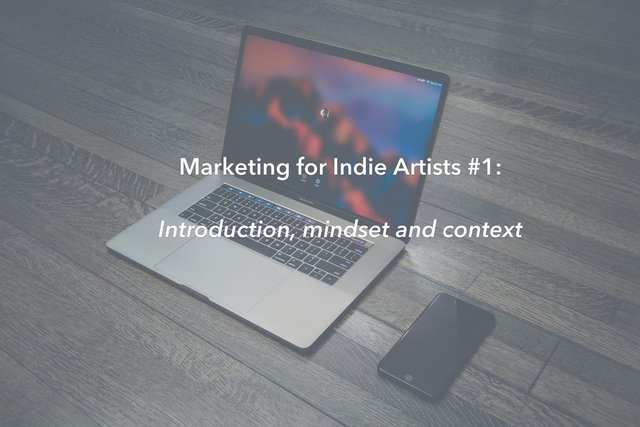
It is written with independent artists of Choon in mind, but will certainly be useful for any artist struggling with marketing themselves and earning real listeners. This introductory post in particular will also be helpful for anyone who wants to understand marketing, communication, or networking better.
New to Choon? Skip the waiting list by signing up for free here.
Why? Read my first post about why I believe in Choon, and why it matters: http://kryptokindmusic.com/out/why-choon-steemit
The guide will be written in a chronological manner, so I highly recommend you read it from the beginning to the end to avoid missing out on important concepts. For instance, understanding context and copywriting will help you get better results in whatever you are doing in the future. Be it Facebook ads, Reddit, Twitter, or anything else.
Topics I cover in this article:
- A better understanding of what context is, and why it affects everything you do
- Why you should treat your music like it's your product, and your artist profile as a brand
- Why people listen to your music, or not
- How to make people remember to play your music, even without a link in their face
- Intent, and why it's more important than links
- Adapting a marketing mindset - Test, analyze, refine and repeat
So without further ado, let’s begin.
Context
I keep mentioning this pretty much everywhere I write these days. Context is everything. It’s the single biggest multiplier to any action, so this is something you have to understand. And you have to understand it well. I consider understanding context to be a "meta skill", meaning it will give you better results at anything else you do.
But what is context actually?
In my own words, context is the vast amount of information surrounding an action, that decides how it is perceived, and it’s outcome. Context often dictates if someone will genuinely appreciate your music or not. You might be on the beach one day with your friends. And a new friend of your friend tags along. As the day goes by, you start talking about music, and you mention you’re a producer.
- Them: “Ah, cool! So you’re a dj?”
- You: “No. But I make music dj’s play”
- Them: “Cool! Can you play some for me now?”
- You: “Sure. *puts on a song on the phone*”
- *Awkward moment of forced listening while inconveniently leaning in for 32 seconds happens*
- Them: “Nice…”
- You: “It sounds much better on proper speakers”
- Them: “Hehe, yeah…"
This person does not get a great impression of your music. And also might never want check it out again because of this.
The opposite scenario, being with the same friend of the friend at a party. And you’re playing. Or the dj plays your song. Then the same friend will most likely be very impressed, and might even talk about you to others in the future. The same person is also more likely to check you out later, because they now want to.
The track itself is exactly the same, but the context is different. And so is the outcome.
Another example
Since I have started to write now, I will be getting asked to write for people every now and then. But writing can be hard, especially when you don’t know the purpose of what you are writing. Someone might ask me to “write an article about vaccines”. This is the action they want me to do, but I have zero context. Meaning that if I start writing it without getting more information, it will probably not serve it’s intended purpose, and waste my time. I end up writing a 1257 word article “Who invented vaccines, and how big is the vaccine market in 2018?”, and send it off.
“WTF?? We need 10 articles/Facebook posts about vaccines, with the purpose of teaching american moms who are confused about doing it or not, to do it. The problem is that the group immunity is failing, and we are seeing outbreaks of polio again. We can’t use your insanely long article for anything. Worst writer ever. Bye”
I did write an article about vaccines like they asked, but it’s unusable. Even though it’s well-researched, well-written and all. Just because they didn’t give me enough context and I didn’t ask for it either, I wasted my time on nothing of value. And got an unhappy client who probably won’t work with me again as well. Context. (made up example. I would of course demand context before writing for someone. Duh)
And yet another example
-Bakery, no context-
Someone: “Go to the bakery next door today”
You: “I can’t, I’m busy. Why?”
Them: “Just because.”
You end up not going, of course. Because you’re busy, and you don’t understand why you should go to this bakery.
-Bakery, with context-
Someone: “Go to the bakery next door today. They give out free, freshly made donuts until 17.00”
You: *already there*
Someone told you to do something, and why. You did, and you’re both happy now.
Extra effect: You now like the person from the first bakery example a little less, because they withheld important information from you. They knew it was free donuts next door, but didn’t tell you. What a douche. You now like the second person more, and are more likely to trust them in the future when they tell you to do something.
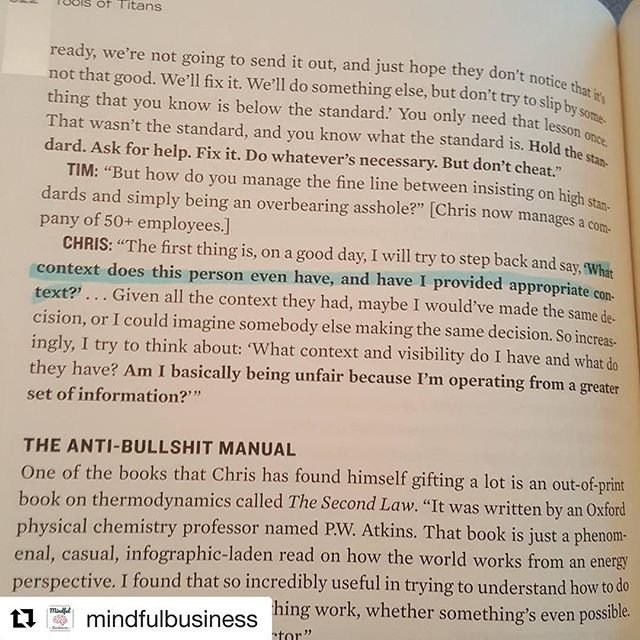
The legendary Tim Ferris also shared a page from his newest book, about context. Original from mindfulbusiness.
Context with music - seeing the human behind the stats
Remember that time someone you don’t know added you on Facebook and sent you a link out of the blue with no information, you clicked it, and absolutely loved it?
Me neither. Because you would assume it’s spam. Because it is.
If companies would do this, you would search up their page on FAcebook, and give them 1 star for spamming. Yet, somehow a lot of indie artists seem to think it’s different because it’s music for some reason. Let me make an example of this below.
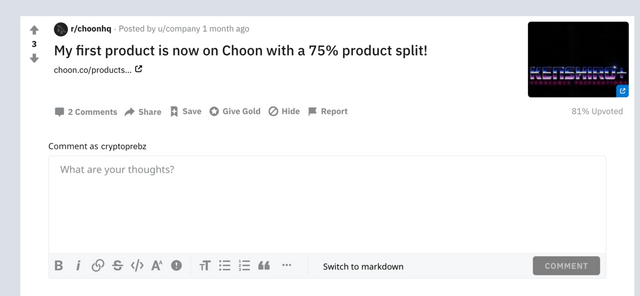
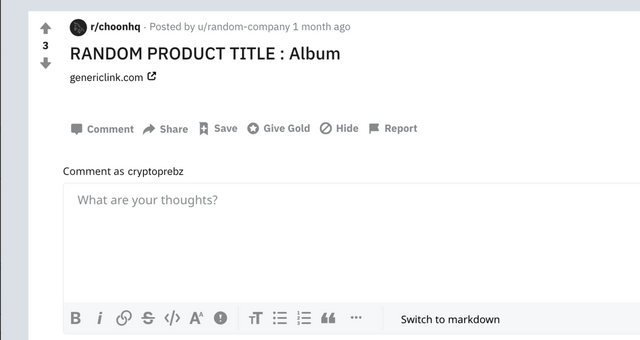
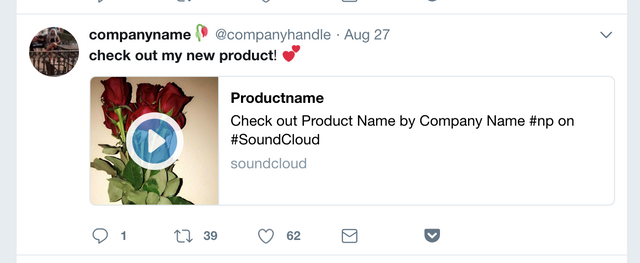
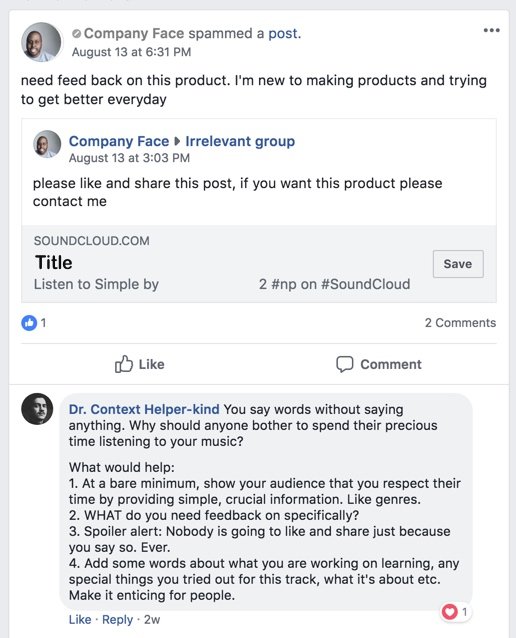
I just replaced "track/song" with product related words in these examples. I don't mean to make fun of anyone, but I think it helps getting the message out.
Spamming means not respecting the recipient, since you are sending them something solely for your own benefit. You fail to realize you are asking them to listen to your 6 minute song the equivalent of them giving you 10% of an hour that day, all in the middle of their busy lives. By not providing any context, you are making it an uneven transaction by only focusing on yourself. If they eventually listen to the track, they are doing it out of guilt, or because they feel obliged to do so. Not because they want to, which is something you could have easily fixed by making it relevant for them.
"Hey mate, I just uploaded a new track. Let me know what you think! =D" (=zero context. If sending this to a friend, they will probably listen to it eventually, but it will feel like a drag if they're busy. Which they are most of the time, just like you)
vs.
"Yoyo, been working hard on this track lately. I tried using high-hat triplets with varying velocity like we talked about earlier, and it really works! Not sure about the pads in the breakdown, but thinking of adding a gate filter or something. The track is quite deep and melodic, inspired by Henry Saiz. Very curious to hear your thoughts =)" (=more context and relevance. You are mentioning things you have talked about before, and you are setting some expectations.)
Moving on.
Your artist name is your brand, and your music is your product
This should be very obvious, yet it doesn’t seem so to most people. Indie musicians promote their music like it would be something different. That because it’s music, free music even, the link itself is enough information for people to get interested. Spoiler alert: It’s not.
“Nobody listens to links.” - Kryptokind
Because what is actually a link? It’s nothing more than a path to a different destination online. And that’s all it is without the extra context added with the words you carefully provide. It’s something you click on, to get away from where you currently are. Think about it: As a musician, you have 2 ways of making your music more interesting. Cover art, and text. This applies to pretty much any medium you share it on.
Intent
Similar to context, this is far more important than having your links everywhere. I decided to call it intent in this article, as it more accurately describes what it is, than “need”, or other words for it. With intent, I am talking about people’s wants and needs. Their intention, and reason for doing something. Not everyone are mindless robots. In fact, most people are far from it. Every single person is an individual. With their own needs, desires and dreams. Not two people are exactly the same. And you have to respect that in your communication.
So I have called someone’s personal desire to check out a song, for intent.
Facilitating a positive intent, is most easily achieved by writing an enticing text that gets people interested. In fact, you can even add extra value to your music by just writing a few extra sentences. Let’s look at this sexy little list of bullets for Tim Ferris’ book. (I’m a huge fan of Tim, he gets context and intent better than most other people)
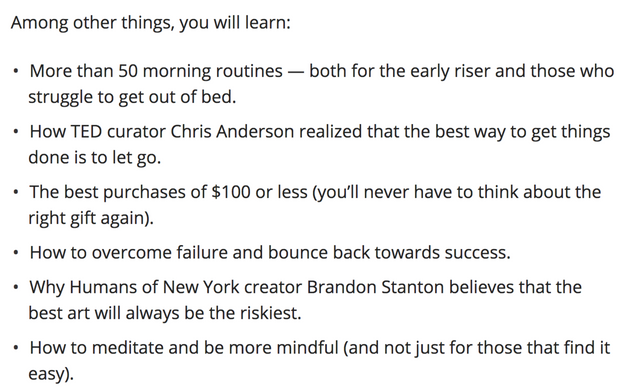 Screenshot from the page about Tim Ferris' book "Tools of Titans"
Screenshot from the page about Tim Ferris' book "Tools of Titans"
Do you see that sentence about his favorite purchases for under $100? Isolated, you might think you’re getting a nice list of great products that are not that expensive. But his second sentence adds a ton more value to this - “Never worry about gifts again”. This is a major selling point for his book in my opinion. Getting a big list of truly amazing products for under $100 can save you A LOT of time and stress in the future when buying presents. And this once sentence alone just added all that value. It added context, and increased positive intent. As is what you should try to achieve when promoting your music as well.
A more music-related example can be found here, on my track called "Chapter 2".
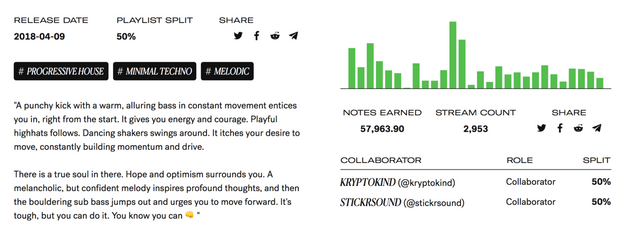
I admit I might not be a champion at this myself yet, but putting in some effort writing about your tracks tends to help a lot. In this first part in quotes, I try to describe the overall feeling, with some deeper meaning. This particular example is quite focused on the elements and feelings. Which may or may not be right for your audience. Regardless, I think them ost important thing is to be genuine. Write from your heart. If you struggle with writing, listen to the track in a different context and try again. You have to feel it too.

This second part is a bit different. Genres and label are mentioned. I mention Beatport and Berlin for social proof, to put the listener in a more open state of mind by knowing other people have enjoyed it as well. This effectively increases the likelihood of them listening all the way through.
Consider every single promotional message you send out to be a billboard you paid $5000 for
Would you pay $5000 for a billboard saying “Hi! I made a new track. Check it out here: -url-” ? Maybe? I mean, it would certainly give you a ton of “exposure” regardless of what you write on it. Especially if you have a funny picture of yourself on it too! Maybe even add some flashing lights to increase the exposure?! Wow, just THINK about all that exposure you will get!
And think about it some more. And then some.
And watch your massive bounce rate, as people have no idea what to expect when manually typing in your link in their browser on their phone, and quickly leave. Exposure is practically worthless without context to nurture a desirable intent in the receiver. In fact, if a lot of people really want to check out your music, they will find it too. Even if it’s hidden in the footer of your ugly website. They might even ask others in Facebook groups, because they really, really want to hear it. They don’t want to hear it because they had a link thrown in their face, they want to hear it because they genuinely really want to. You created a desire for your music, so the link is just the icing on the cake to make it convenient for them to do so.
This is how I perceive links and exposure. And why I don’t allow self-promotion in the Unofficial Choon Artists Facebook group I’m running. This is also why I allow people to post other people’s music if they include a nice text about why they are sharing it to the other artists in the group. This also encourages people to be more helpful in the community in general, further increasing the responses posts like this will get.
Because if someone posts a link to a song created by someone who contributes to the community, while also including their good reason for doing so - people will want to check it out. Both because they know the person being posted about, and are likely to have a positive attitude towards them. And because they have a good reason to check it out, in writing, along with the link.
Can it be exploited? Certainly. In theory, people can just talk to each other and agree to post each others music. I’m not stupid. But at least people are adding value by giving a reason for checking out the music. They are practicing their writing skills. And in the end, also increasing the quality of the content on Choon by writing better texts. Which is something everyone will benefit from, listeners and artists alike.
Marketing mindset - Test, analyze, edit, test again
The last bit here, is about adapting a proper marketing mindset. It’s quite easy actually. You need to get into the mindset of constantly testing and experimenting with whatever you are doing. Testing online channels can be hard though. And is barely even possible for legacy streaming sites, or even Beatport.
The basic idea is just knowing what is working, and what’s not. And then really understanding why as well. (context) Are you actually getting more streams from posting on Instagram every day? Does people from Twitter listen to the music or leave? What about Facebook? Reddit? - Learning about this will help you manage your time, give you better results, and eventually even make marketing more fun - since it works, and you are making progress.
Testing
Currently on Choon, testing is slightly limited, but not impossible. You can set up your own link cloaker (recommended if you are above average technical and have a website) , or use a hosted one like bit.ly. This will enable you to at least track the amount of clicks. But since we now understand context, not all clicks are created equal.
A visitor from a Facebook group you posted in without including genre and an enticing, preselling text, are likely to not stay around for long. Whereas a link click from Instagram, from someone who’s been following you for some time and have heard your video promos, are likely to stay longer. So keep this in mind when looking at your tracked clicks.
A better way for now, is to promote individual tracks from different sources. But then you won’t really know if it’s the quality of the music, or the promotion channel that is actually making people stay. A better way is to make a playlist with the track you want to promote at the top. Then you also have the added benefit of a massive text field you can customize for every single traffic source, to increase the chances of them streaming. I personally like to write a little description of every single track in the playlist, so listeners can decide for themselves what sounds most relevant for them.
This way, you can have separate playlists for separate channels, and the streaming numbers will give you the data you need.
Summary
It’s been a long read, and we have been through a few different topics. To recap what I want you to remember, here are some handy bullets:
- Understand context, and respect your listeners time and interests
- Add context by telling your readers and listeners how the music is best enjoyed, and what they can expect
- Facilitate a positive intent to check out your music, by making it relevant for the recipient through your writing
- Treat your music like it’s your product, and your artist name as your brand
- Imagine you paid money for all your posts - make them count
- Experiment, analyze, tweak and repeat. Always.
- Be genuine. It works.
Ask yourself these questions when posting something:
- Am I providing enough context when sharing this?
- Who are likely to see it, and what will they think when seeing it?
- Are they inclined to check it out? Why, or why not?
- Would I click it if I saw it here without knowing who I am?
- Are these people even a relevant audience to promote my music to?
- What would make them instantly click on this?
- Am I tracking the results from this, or just hoping my streams have increased tomorrow?
The next article will be about: Copywriting for artists.
---
Found this useful? Then consider upvoting and following me =)
You can also support me by listening to my music for free on Choon.
You can find my profile here: Kryptokind on Choon (#melodictechno+#minimaltechno,#progressivehouse + #deephouse, and more. Some with inspirations from#italo and #psytrance )
I also have set the playlist split to 50% for all my tracks, allowing you to get 50% of the royalties from any of my songs streamed through your playlist. This rate may change in the future.
New to Choon? Skip the waiting list here.
Want to learn more about Choon? Check out my comprehensive Steemit post about it here: Why I Believe in Choon, and why it matters
Wanna check out my website? Go for it.
Want to check out my Facebook Messenger bot? It's here, Kryptokind the robot.
Your post was manually selected and rewarded by @illuminati-inc (IINC) with the support of Curie. Latest Curator's Choice post: here. About IINC: here.
Downvoting a post can decrease pending rewards and make it less visible. Common reasons:
Submit
Awesome! What an honor 😁
Downvoting a post can decrease pending rewards and make it less visible. Common reasons:
Submit
Hello @cryptoprebz, thank you for sharing this creative work! We just stopped by to say that you've been upvoted by the @creativecrypto magazine. The Creative Crypto is all about art on the blockchain and learning from creatives like you. Looking forward to crossing paths again soon. Steem on!
Downvoting a post can decrease pending rewards and make it less visible. Common reasons:
Submit
Awesome, thanks a lot! Much appreciated 😄
I checked out your magazine earlier, and I have to say - sleek design is rare in the cryptosphere. Well done!
Hope your IMO goes well 👊
Downvoting a post can decrease pending rewards and make it less visible. Common reasons:
Submit
thanks for writing this very useful and interesting article. i checked your facebook-page and wow you have a lot of likes on your posts. can you give us any insights about how facebook-promotion works and how much your followers engage (click, repost, comment) on your posts? it would help me a lot..
Downvoting a post can decrease pending rewards and make it less visible. Common reasons:
Submit
You're welcome, and thanks for reading =)
I will for sure! The most extensive article so far is about Facebook ads actually, and will be #3 or so in the series - There I go through all the different objectives, as well as set up a real ad I have been running until now. With the actual results from it as well.
As for engagement, Facebook often requires you to pay up a bit. Organic reach is low if you don't post great content often, or if you just got a lot of new fans etc. But now that we understand context better, the article about Facebook ads will also make a lot more sense once it's out 😉
Downvoting a post can decrease pending rewards and make it less visible. Common reasons:
Submit
already looking forward to #3! How often to you plan to post here?
Downvoting a post can decrease pending rewards and make it less visible. Common reasons:
Submit
Hehe, nice! I'm thinking once a week or so for the marketing series =)
Downvoting a post can decrease pending rewards and make it less visible. Common reasons:
Submit
Great read! I've definitely noticed more engagement when you engage the other person. We're all Artists of sorts and want to be heard. Bravo Amigo. Upvoted and Resteemed!
Downvoting a post can decrease pending rewards and make it less visible. Common reasons:
Submit
Thanks mate, much appreciated! And yes, that is what engagement is 😁
Everyone has music or playlists, everyone wants to be heard, and everyone wants to earn notes. So finding your own path and understanding who your audience is, is crucial to building your brand and creative value in the long run.
Downvoting a post can decrease pending rewards and make it less visible. Common reasons:
Submit
Good article.
The tl;dr is basically: 1) Don't spam and 2) Don't ask people to listen to your music.
It would be cool if you could put an intro similar to the summary so people knew exactly what was going to be covered (and what wasn't).
Cheers.
Downvoting a post can decrease pending rewards and make it less visible. Common reasons:
Submit
Thanks, that's a great suggestion! Will update it today, and try to include a similar intro to my future articles as well 👌
As for the tl;dr - Kinda, but not really. Understanding context is a meta skill required to succeed in marketing, and pretty much anything else too. It helps build empathy and connect people. It's massively important, and also the reason I spent roughly 2000 words explaining it as an intro to the rest of the series.
Downvoting a post can decrease pending rewards and make it less visible. Common reasons:
Submit
Oh I totally agree. This is not obvious to many people, and those same people probably aren't going to (want to) read (2000 words) about it either. I found it useful though :)
Downvoting a post can decrease pending rewards and make it less visible. Common reasons:
Submit
Updated it now. Better intro, as well as I added some more examples =)
Downvoting a post can decrease pending rewards and make it less visible. Common reasons:
Submit
I just read this article and its even better the second time around man. Great writing, great information. This journey requires so much knowledge and so many different skill sets for artists right now its crazy. A lot of fun though ;)
Downvoting a post can decrease pending rewards and make it less visible. Common reasons:
Submit
Congratulations @cryptoprebz! You have completed the following achievement on Steemit and have been rewarded with new badge(s) :
Click on the badge to view your Board of Honor.
If you no longer want to receive notifications, reply to this comment with the word
STOPDownvoting a post can decrease pending rewards and make it less visible. Common reasons:
Submit
I really found it usefull i upvoted you and surely upvote those who reply mine comment too
Downvoting a post can decrease pending rewards and make it less visible. Common reasons:
Submit
Congratulations @cryptoprebz! You have completed the following achievement on Steemit and have been rewarded with new badge(s) :
Click on the badge to view your Board of Honor.
If you no longer want to receive notifications, reply to this comment with the word
STOPDownvoting a post can decrease pending rewards and make it less visible. Common reasons:
Submit